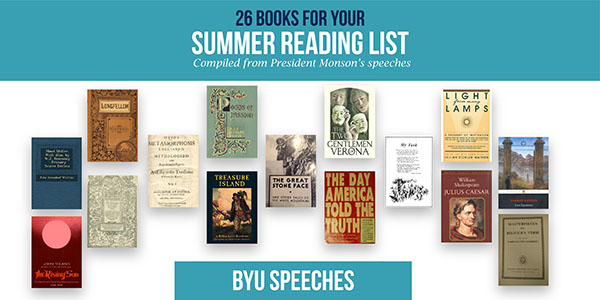President Monson–Inspired Summer Reading List
June 1, 2017 • Blog Post
The long days of summer are here, which means time for reading in the sun. We figured our literature-loving prophet was the perfect source for compiling a book list fit to both entertain and inspire. We’ve dug through our archives of President Thomas S. Monson’s speeches and created a summer reading list (complete with the BYU speech it’s referenced or quoted in) made up of fiction, poetry, nonfiction, and drama that’s sure to pique your interest and get you reading this summer.
Fiction
Great Expectations by Charles Dickens
(Referenced in Monson, “Great Expectations,” 11 January 2009.)
President Monson called this an old favorite of his and compared BYU students to Pip, saying they have “great expectations,” and great things are expected of them.
“The Great Stone Face” by Nathaniel Hawthorne
(Referenced in Monson, “Decisions Determine Destiny,” 6 November 2005.)
According to President Monson, “We tend to become like those whom we admire,” just as the protagonist of this classic story does.
A Tale of Two Cities by Charles Dickens
(Quoted in “Decisions Determine Destiny.”)
“It was the best of times, it was the worst of times, it was the age of wisdom, it was the age of foolishness, it was the epoch of belief, it was the epoch of incredulity, it was the season of Light, it was the season of Darkness, it was the spring of hope, it was the winter of despair, we had everything before us, we had nothing before us.” President Monson said this was an apt description of our day.
Treasure Island by Robert Louis Stevenson
(Referenced in Monson, “In Search of Treasure,” 11 March 1997.)
As a boy, this was one of President Monson’s favorite reads. And stories such as this inspired President Monson to come up with the three pieces of the treasure map to eternal happiness.
Poetry
“Bag of Tools,” by R. L. Sharpe
(Quoted in Monson, “Decisions,” 6 February 1977. )
“Isn’t it strange
That . . .
. . . common people
Like you and me
Are builders for eternity?”
“Columbus” by Joaquin Miller in Light from Many Lamps, edited by Lillian Eichler Watson
(Quoted in “Great Expectations.”)
It was a brief phrase in an entry of Columbus’s journal that motivated poet Joaquin Miller to write “Columbus” and that inspired President Monson to say, “Perseverance will pay rich rewards.” The inspiring phrase? “This day we sailed on.”
“God Knows,” by Minnie Louise Haskins in The Desert
(Quoted in Monson, “Guideposts for Life’s Journey,” 13 November 2007.)
In the introduction to her poem “God Knows,” Minnie Louise Haskins wrote: “I said to the man who stood at the gate of the year, ‘Give me a light, that I may tread safely into the unknown.’ And he replied, ‘Go out into the darkness and put your hand into the hand of God. That shall be to you better than a light and safer than a known way.’”
“How Do I Love Thee?” by Elizabeth Barrett Browning
(Referenced in Monson, “A Time to Choose,” 16 January 1973.)
President Monson called this a “very beautiful classic—. . . almost a song.”
“It’s Up to You” by Clinton T. Howell
(Quoted in “Decisions.”)
“You are the one who has to decide
Whether you’ll do it or toss it aside
Whether you’ll strive for the goal that’s afar
Or just be content to stay where you are”
“Light Shining out of Darkness” by William Cowper in Masterpieces of Religious Verse
(Quoted in “Great Expectations.”)
This poem is a lyrical exploration of the nature and purpose of God. And according to President Monson, “[God] is the author of your great expectations.”
“Maud Muller” by John Greenleaf Whittier
(Quoted in Monson, “Three Gates to Open,” 14 November 2006.)
“For of all sad words of tongue or pen,
The saddest are these: ‘It might have been!’”
Adding to this sentiment, President Monson said,“You must continue to choose the harder right, instead of the easier wrong.”
“Morituri Salutamus” by Henry Wadsworth Longfellow in The Complete Works of Longfellow
(Quoted in “Great Expectations” and “Decisions.”)
“How beautiful is youth! how bright it gleams
With its illusions, aspirations, dreams!”
“My Kingdom” by Louisa May Alcott
(Quoted in Monson, “As a Chosen Generation, Be Prepared,” 2 November 1975.)
President Monson councils that we search for truth and look within, that we be like the speaker in Lousia May Alcott’s poem “My Kingdom” and “not ask for any crown.”
“Of the Pythagorean Philosophy” by Ovid in Metamorphoses, translated by John Dryden
(Quoted in “Great Expectations.”)
Bad habits lead to life’s pitfalls. According to President Monson, “At first we could break them if we would. Later, we would break them if we could.” Ovid explains this concept in his poem “Of the Pythagorean Philosophy.”
“Stick to Your Task” in Best-Loved Poems of the LDS People, edited by Jack M. Lyon
(Quoted in “Great Expectations.”)
This poem holds simple wisdom that President Monson loves: “Stick to your task till it sticks to you.”
“Which Loved Best?” by Joy Allison in McGuffey’s Third Eclectic Reader
(Quoted in “A Time to Choose.”)
This children’s poem is a lesson on love and service. President Monson holds it close to his heart and calls it “more [his] style.”
“The Winds of Fate” by Ella Wheeler Wilcox
(Quoted in “A Time to Choose,” “Decisions,” and “As a Chosen Generation, Be Prepared.”)
President Monson believes that the ability to choose our futures inspired Ella Wheeler Wilcox to write this poem.
Nonfiction
Commentary on Euclid by Proclus
(Quoted in “Decisions Determine Destiny.”)
When Euclid tried to teach Pharaoh geometry, Pharaoh asked if there was no easier, quicker way. Euclid responded, “There is no royal road to geometry.” Similarly, President Monson counsels, “There is no royal road to salvation and exaltation.”
The Day America Told the Truth: What People Really Believe about Everything that Really Matters by James Patterson and Peter Kim
(Referenced in “Decisions Determine Destiny.”)
In a survey printed in this book, people were asked what they would be willing to do for $10 million. After citing the results, President Monson said, “Where money rather than morality dictates one’s actions, one is inclined away from God.”
More Children’s Letters to God compiled by Stuart Hample and Eric Marshall
(Quoted in “Decisions Determine Destiny.”)
President Monson found this compilation of children’s letters to God “most interesting.” His favorite letter was by little Matthew: “Dear God, I read your book and I like it. . . . I would like to write a book someday with the same kind of stories. Where do you get your ideas? Best wishes.”
My Life and Work by Henry Ford and Samuel Crowther
(Quoted in “Great Expectations” and “In Search of Treasure.”)
Supporting wisdom from Henry Ford—“An educated man is not one whose memory is trained to carry a few dates in history—he is one who can accomplish things.”—President Monson advised students to not overlook the importance of learning to think.
The Rising Sun by John Toland
(Referenced in “Guideposts for Life’s Journey.”)
Summarizing his book The Rising Sun, Pulitzer Prize–winning author John Toland said, “There are no simple lessons in history, that it is human nature that repeats itself, not history.”
Drama
Henry VIII by William Shakespeare
(Quoted in “Guideposts for Life’s Journey.”)
This is President Monson’s favorite work by Shakespeare. And his favorite passage is act 3, scene 2, lines 2,370–72.
Julius Caesar by William Shakespeare
(Referenced in “In Search of Treasure.”)
“Beware the ides of March”—though for President Monson these ides were the marker not of Caesar’s assassination but of BYU midterms.
Our Town by Thornton Wilder
(Quoted in “Guideposts for Life’s Journey.”)
Looking back at her life, Emily of Wilder’s Our Town asks, “Do any human beings ever realize life while they live it—every, every minute?”
Two Gentlemen of Verona by William Shakespeare
(Quoted in “A Time to Choose.”)
After quoting, “They do not love who do not show their love,” President Monson posed the question: “How might you and I demonstrate our love for God and love for our fellowmen?”




